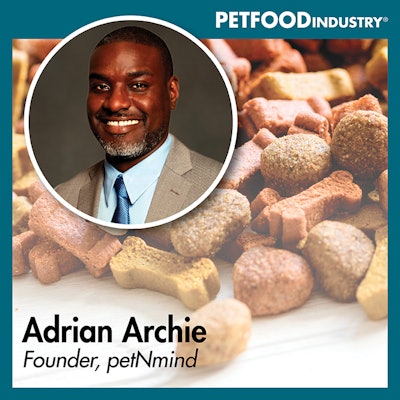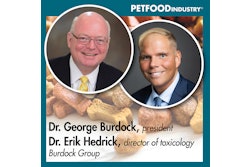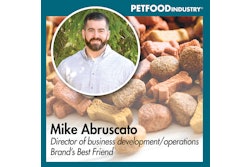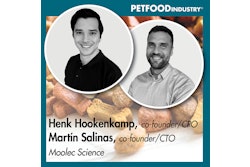
Emotional intelligence and customer communication are necessary soft skills to thrive in the modern pet retail space. Join host Lindsay Beaton and her guest, Adrian Archie, found of petNMind, as they explore the keys to gaining and retaining customers for pet retailers.
The below transcript is from Episode 75 of the Trending: Pet Food podcast. Host Lindsay Beaton and Adrian Archie, founder of petNmind, talk about the characteristics needed to be successful in today’s competitive retail pet space. You can find the episode at Trending: Pet Food, on SoundCloud or on your favorite podcast platform. This episode originally aired on November 20, 2024.
We want to thank Coperion for sponsoring this podcast. For over 50 years, Coperion has supplied the most recognized pet food brands throughout the world with state-of-the-art dry bulk material handling systems.
Lindsay Beaton – editor, Petfood Industry magazine, and host, Trending: Pet Food podcast: Hello, and welcome to Trending: Pet Food, the industry podcast where we cover all the latest hot topics and trends in pet food. I’m your host and editor of Petfood Industry magazine Lindsay Beaton, and I’m here today with Adrian Archie, founder of petNmind. Hi Adrian and welcome!
Adrian Archie, founder of petNmind: Hi Lindsay. Thanks for having me. This is exciting.
Beaton: In case you’re unfamiliar with Adrian or petNmind, here’s what you need to know.
Adrian is a serial founder, accomplished entrepreneur, skills synergy mentor, and former pro football player, and he brings a wealth of experience from a decade-long career in medical device sales and brand management. He is the founder of the innovative small-box franchise concept petNmind Naturals & Self-Wash.
petNmind was founded in 2014 with the goal to support the beneficial bond between people and their pets, specifically cats and dogs. petNmind offers high-quality products supported by a staff that prides themselves on being ground-level pet nutrition experts. The company’s three locations (in Florida and California) also offer hygiene services.
Adrian’s pet retail experience as well as his overall business acumen are why I’ve brought him on today to answer this question: What are the top retail strategies that lead to success in the pet space?
Adrian, I have a feeling you have a very interesting backstory, and I love a good origin tale. How did you land in the pet space, and why retail?
Archie: Great question. I'm 44, so I'm middle aged. I grew up in North Carolina, and my mom tells this story all the time. I wanted to be a veterinarian and went to college, University of Richmond to do a pre-vet major. Ended up not doing it. I played football, and I was young, so I became a psych major. But that passion for animals has been my entire life. I've had every type of pet you could think of, especially dogs and cats, but lizards and everything else. I also wanted to own a pet store next to that vet office, is what I said when I was a child. I fulfilled one of those dreams, and that is really where it comes from.
I played pro football briefly after college, then went into medical device industry for about 10 years. When I decided to jump ship and become an entrepreneur, it just made sense that I would go into pets. Obviously, I didn't want to go back to vet school at that point, but I could make that dream of owning a pet store, in this case, a pet supply store, a dream.
The reason I went into retail is that I had an Abyssinian cat when I started my adult journey in corporate America, I'm living on my own and the Abyssinian, his name was Rocco, died a couple years ago. He was 18, but he was the inspiration of starting a company in the pet industry, and specifically in pet retail.
Rocco, back in 2005 when I got him, had a lot of issues that they couldn't figure out. Everybody I went to, and just being a nerd that I am, I figured it was nutrition. The whole natural, holistic pet food space wasn't there yet. It was starting, but I figured out it was nutrition. I did a few things on my own, and he and he got better and lived 18 years. Very healthy. When I came out of corporate America in 2014, the whole natural food space was starting to become a real thing, and the innovation was through the roof.
I realized that most pet parents don't really have a great gauge on nutrition. They do what the commercials say. Veterinarians don't really focus on nutrition, so people were lost.
I came from medical devices, selling drills and saws to brain surgeons and spine surgeons. I'm good at breaking information down to pieces that people can digest. It made sense that I would go into something that helped my pet years before I started it, and it was nutrition, and that's retail. That's why I did it. The industry has made that make a lot of sense since I started it 10 years ago, because the innovation is through the roof. That's the premise, and that's why I went into retail, and why I love animals.
Beaton: When it comes to pet retail, there are a lot of different ways you could have gone. There are places that are mostly accessories based, there are places that are mostly food based. There are different levels of nutritional knowledge. Some have extra stations like washing and grooming services, and now there are even veterinary/retail combo type things. Were there any retail strategies that you really wanted to focus on implementing? Anything that really spoke to you as a strategy? What made them important to you?
Archie: I'm sure we'll get into this later, but the small box concept is something that really made sense to me. I'm a people person. One of our taglines is, “We're a people place for pets.” I love people. I'm huge on emotional intelligence and learning about that. I lead with that in life and business – how best to communicate with people and interact with people. I love being a part of other people's success, sometimes even when they are competing against me. I like to see people win. That's who I am.
I knew that pet parents are confused when it comes to nutrition, and innovation is absolutely through the roof. There’s something new out there every day.
The goal was to have a small box concept, not just from the business perspective, but really from the customer perspective. It's somewhere you can come into. It's 1,000- to 2,000-square-foot space. We focus on nutrition and hygiene, so we have the wash station. Some of our locations also groom. But the goal there is the day care of the pet.
When you look at the pet industry, even still now, it's very health, vet oriented, but that's what 5% to 10% of their life. Some people don't even go to the vet once a year. That is a very small part of their life. You have the other 90% to 95% of their life is, what do they eat? What do they play? What is the exercise? What chemicals should I have in my house? When should we groom them? When should we cut the nails? When should we clean the ears? When should we brush the teeth? When should we do all those things?
That was the goal: to really support people in the care of the pet. We like to say that pets don't speak human. That's another tagline we have, so we translate. We understand what we're doing. We understand our product lines very well. We're curated, and we know what people need, those five or six buckets of what people go through. We really wanted to compliment vet care from a perspective of wellness and not shots and surgeries and vaccinations and those things. That was the goal, so that small box allows people to walk in not be intimidated. They get to talk to somebody that’s solution oriented and it's really, really the day-to-day care of the pet. That's what petNmind stands for.
When you make decisions when you have a baby, you don't ask the pediatrician what playground to go to, or should I give him this type of apple versus that one because he's allergic to this. That's not what we do in the human world. I have a five-year-old daughter. At some point she could talk. She looked like this. She wants this. She needs to potty. Animals never talk.
How do you support those people? As we get busier, as people, we have different jobs and side gigs, and we're traveling, and we have kids, and all these pressures we have in life, we understand deeply how much pets mean to people. That's what we know now because of COVID and other things.
You have this life in your home, maybe more than one, and it's very important to you. There are all these products out there. All these places you can go, and all this stuff coming at you. How do you fit that pet into your life and who supports that? That's our goal. That's what the small box concept is about: relationships, solutions, and at the end of the day, wellness.
Beaton: Now, I want to come at this from both the business side and then from what you're hearing from your customers, but I want to start with the business side.
This sounds like there is a lot of education involved in making sure the employees of your stores can fulfill this mission of yours. How did you educate yourself? How do you educate your employees and keep them up to date on the latest nutrition? Are the pet food manufacturers involved? Are groomers involved? Where do you get the information from? How do you educate everybody?
Archie: That’s a great question. When we franchise the concept and right after COVID, 2022-23, that was the biggest challenge. I'm a nerd. I'm a curious person. I like to know things, not to tell everybody else what I know. I like to understand things from the concept level, and then it kind of extrapolates from there. If you can understand the foundation, then you can understand the roof, right? That's how I think, that's how I live. I read maps for fun when everybody else is using GPS. I'm curious. That's how I learned.
It's been a lifelong endeavor of me just knowing this type of thing. It's my passion. I also came from the human world and looking at brain surgery and helping and forming so I understand how the body works. I understand nutrition. I understand leaky gut and all the different things that may happen from an employee in a franchisee standpoint. It's a team effort, right? We're a young company, so I'm growing my team as far as being able to help my franchisees advance in nutrition and day to day pet care.
The goal is to, number one, have people that like people. If you don't like people, pet retail isn’t for you, because, again, pets don't speak human. The humans are making the choices, and we must communicate with them, as well as love the pets and handle them when they come in.
Number one, they must have a passion for learning themselves and teaching. Pet nutrition itself isn't difficult. It's something that people can learn. Again, once you learn the foundation, then the roof and the windows and the doorknobs and the lights make more sense.
When they come onboard, we educate from the ground level on digestion and leaky gut, and how those things can turn into problems. From there, we go into the different buckets of nutrition. You have the dry kibble everybody knows those. Now you have raw, freeze-dried raw, lightly, gently cooked, goat milk, and fermentation, and all these different things. They all come back to the same thing, and that's healthy digestion. That's where we start.
If we can understand digestion, if we can understand how cats and dogs work, because we specialize in cats and dogs, then from that perspective, you can start to understand the products and how you discuss those with customers at the end of the day. This is what I tell my franchisees all the time. People, if you spend about five months, six months, in a pet supply store like ours, where we're only selling quality brands and cutting-edge products that we understand well, people are coming in with about the five or six same problems. They're not coming in saying, “We found this dog on the moon. What do we do?” They're coming in with, “The dog's not eating. He has a skin problem. The cat's throwing up. There are ear infections, yeast problems, hip and joint problems.”
They come in with the same five or six buckets of things. Then it branches out depending on the breed or the age or whatever is going on. Once we understand that foundation, and we experience enough of which people are coming in, we're curated. We're not a big box store. We don't have endless aisles of stuff. We know exactly what people need. We are very intentional in the brands that we carry. We know how those brands work. We've had enough experience with different breeds and different things that people come in and talk about that it makes it much easier.
It takes a little time. It takes some hand holding. But I think the number one thing that we do well is we like to help. We like to offer solutions, and then that's where we fit in. We work with more holistic-oriented products and recommend places. At the end of the day, it comes down to -- do you like to help. Do you like people? Do you like animals? Then we can teach them.
Manufacturer reps help. We try to lean on them as much as possible to educate really, their value propositional. Why Open Farm is a certain customer type versus Farmina versus all the different brands.
We understand who we're talking to because we've experienced it, and that's what I'm big on. Franchising. You always say is that you're in business for yourself, but not by yourself. That's real when it comes to pet supplies. On the holistic end, is that we're there to help, but the business owner, even if they're semi-absentee and they're not there every day. People want to know their story. People want to know why they are doing this. Once they trust you, it's like a pediatrician relationship with your child. Once they trust you, then it's much easier to understand what they need and how to help them.
We're not trying to reinvent the wheel from the perspective of what we're doing. We know what we carry. We know what we do well, and we know what people need. That’s how we address it, and that's how we make sure that they're learning outside of that if the brand fits our quality standards. We don't make franchisees carry certain brands. Every area is different. We have two stores in Florida and one out in LA and a couple more in the works in other parts of the country. The goal is to know the foundation well, and from there, we know what people are going to ask us at that point.
Beaton: I want to expand a little bit more on the curation aspect, because I find it fascinating in an era of trying to be everything to consumers and in an industry that is so, so saturated and there are so many options, so many claims for so many things, you've kind of pushed back on that and gone, “No, we don't need to be everything to everybody. As we're listening to our customers, they're coming in with roughly the same five or six issues for their pet, and if we can make sure we cover those bases, then we can help more specifically with other things they have.”
Was that always an intentional choice of yours, or was your curation helped along by seeing what your customers needed and realizing that you did not have to have a ton of shelf space and every product on the market to meet customer needs?
Archie: When I left corporate America, I literally jumped ship. I'm a futuristic thinker, and that's not just me giving myself that tag. In corporate, you do all these different personality tests. Gallup is what we used at the company I was at. They really hone in on who you are. I jumped out and made every mistake in the book, right? I literally did. So now my franchisees don't have to make those mistakes.
I had a store full of stuff at first. Wasted a lot of money. A lot of stuff went bad. I'm a sales rep in experience, in nature. I have over at this point, 20-plus years in sales and different capacities. At the end of the day, you're selling a product, and it's to a person, so what I do well is pay attention.
If you make me write down my five or six things that I go by in life, it's consistency and paying attention to everything that's going on around you. As humans, we have millions of bits of information coming at us a second, and we can only handle about 40 or 50 bits of that. If you're not open and looking and aware and paying attention, you're going to miss so much because you can't get all of it.
I do really well at homing in on what is it that we're doing? What is it that they're coming in for? What's the result? What's the end goal? Because the end goal is directly related to the steps that happen to get there. It took me five or six years, and one of the mistakes I made is when I found it, I didn't hire anybody in my business for like, two or three years, which was not smart, because I was burnt out. What that allowed me to do at the ground level, however, is really see what people are going through.
So yes, that's the challenge we're facing in pet. We're coming from a big box world and a vet world, and that's the world that people know. What I found is that people -- most -- aren't happy about that. Sure, I grew up in North Carolina, and some people still had the dog tied up behind the house to a tree. That's just not the reality. I live in Florida now. You don't see any dogs living outside down here, they are all house dogs. Now the pets have become truly our family. They’ve become our children. People want an experience of what do I do to make sure they're healthy and fit them into my life and my schedule as easy as possible. That's why you’ve seen online do well. It’s really a convenience factor. That's what Chewy and THE Amazons of the world is --convenience. It shows up at the door.
Guess what we can do locally? We can bring it to your door. We're a local small-box business and know our customers well from there, even as the industry expands into all these different areas. I think it's all relevant. I think it's needed. We pick and choose in those buckets because it's relevant and it helps.
But people, at the end of the day, want a convenient life, and it's based on wellness. Wellness, no matter where you're at, wellness means the same thing, and that's wellness in them and the pet, because that relationship is symbiotic. If your pet's healthy, if your cat lives 18 years, that's 18 years of wellness for that human too.
All the options -- that's probably the biggest problem that pet parents have. I'm saying pet parents, because everybody's not a pet parent, and that's who we're talking to. If you're spending $20 on a bag of pet food at Walmart, probably not our customer, maybe for grooming and hygiene, but we're not talking to everybody.
I learned that in sales day one, you're not marketing to everybody, and if you think you are, then you're not going to get anybody. We're speaking to a very specific people that call themselves pet parents, and it's four or five buckets of what a pet parent is, right? You have some that are doing it for vanity. They like the dog breed, and they have it, and they may not be as concerned as you think they are.
You have others that know everything in the food and know everything that's on the label, and they want to know where this ingredient is from, and that's why you have brands like an Open Farm and others that you can scan and see the sources.
Of those four or five personality types of pet parent, we know who they are. We know what they're going to be interested in, and it comes from experience. So yes, you can try to be everything to everybody. What we found when it comes to pet nutrition and pet hygiene and their wellness, the people we are talking to want solutions. They want somewhere where they can come and have conversations. They want somewhere where they can come and spend 15-20 minutes talking to somebody and really dialing in to what we have.
We’re also curated, but also in that curation, we can address things that we may not carry on a day-to-day basis, right? We can get other things if it's appropriate, but I don't think that anybody, and I'm not beating big box up, but that's an experience of you going to the grocery store knowing what you want, right?
You're not really going there looking for any real answers from real experienced people that are in that store on a regular basis. They know what people want, they've talked to them, and they know what product works for that right. We're not trying to be everything to everybody, because in my experience, just in my background in sales, that shotgun approach doesn't result in longevity.
Beaton: Other than the curation aspect, how have your customers influenced how you run your business? You touched on online versus in store. That’s certainly an area of not contention, but discussion right now, because people are going for the convenience factor. It is very convenient to shop at 9:30 at night in your pajamas from the couch. But retail still has things to offer, and you've mentioned some of those. What have your customers told you that helped you craft an experience that makes them want to come back to a physical space to shop?
Archie: Enlightenment, understanding why they're doing something, understanding how digestion works. It's our goal that our customers know what leaky gut is, because most of what's going on in a dog or cat when they are having problems, it goes back to stuff like leaky gut. That's how we teach.
We teach that you have a base diet. Then we add variety through toppers, hydration and a supplement if you need it. Coming from a perspective that we're consistent in how we teach.
When I first opened in 2014, what my customers taught me is most people aren't aware. Everybody's not looking at pet foods and other things to engage them. What they do know is the dog has a problem, and they give them pills and cytopoint shots and all this stuff all the time, and it never seems to go away. They don't know why people want solutions. Most people that are pet parents will spend the money if it's a solution that's helping them, and that comes from trust.
I didn't have a huge marketing budget when I started, so I grew through word of mouth and what people were saying when they came in. They were saying, “Hey, my sister or my coworker or my neighbor or somebody sent me here and they said that you helped them with this, and we're having the same problem.” That's what my customers taught me, is that many of them are having the same problems. Number one.
Number two, they want to understand why -- the experience of it. In the human world, going to the doctor, they listen to your heart and look at your throat and look in your ears and maybe take some blood, and then they say, “This is what's going on, go to the pharmacy and they'll give you a pill, and you take it these many times a day.” That works for us, because we can talk and we know how we feel, and we don't need somebody else to tell us how we feel.
When you have this animal that -- people want to see them eat every time. People want to see them healthy. They want to be able to run around. They don't like when they're itchy, but the animal can't tell them what's going on. People simply want a sounding board, and they want an answer that works, and they don't have to pay for the appointment. They can walk in the store and talk.
Convenience is important, but again, we deliver, so we can check that box. What is hard for other options of out there that people can get is pet products with a human touch. It's the human feel. It's the customer service. It's us walking the bag to the car. It's their kids coming in, and we grow up with them as the business grows, their family's growing. It's really knowing who we are.
When I was in medical devices, and I'm in surgery and it's a patient on the table, it's a doctor and a nurse that's helping that patient. It's hospital staff that is making sure that patient lives and they go home healthier. It's the same thing in pet.
What you start to realize is it’s not always about the product, it's about the connection. That's what we teach. Just as much as we teach product, just as much as we teach health, we teach to connect with these people. That's what we need in this world. As it gets crazier and when polarized, what we're losing is connection.
So, yes, products, yes, curation, but what my customers have indicated to me and why they tell everybody about us … if you read reviews from my early years when it was literally just me, it’s not only does Adrian know what he's talking about, and not only they have these products that we can't get anywhere else, but we like him, and he connects with us. He cares about us. I That's what most businesses these days, especially on the local level, people still absolutely do want to shop there. Local people still want to be connected.
I can't tell you how many times somebody walked into the store with their pet, and somebody else walks in with their pet and they don't know each other, and the next thing you know, they're talking in the store for 20 minutes to each other, doing doggy dates. That's what we're losing in the world.
Businesses can recreate that, and yeah, have the right products, and yeah, curate it. But it's really that connection, and that's what we do well. That’s what our customers have told us. The product is they trust us enough to ask, “What do you think I need to do?”
The beauty of it is, because we're not wizards, we're not psychic, everything doesn't work the same for everybody. Just because it worked for the last 10 dogs, it may not work for this one because they may have something else going on. They come back and tell us it didn't work, and they want another solution. That's what customers want, is connection and honesty and transparency, and that's what we do.
Beaton: I think you have really hit on something there. Not to turn a pet food podcast into a waxing philosophical for too long, but pet food used to be largely transactional, right? It was, I have this bag of nutritionally complete kibble. You buy the bag of nutritionally complete kibble. The end
There’s been a push the last several years for consumers, and I don't think this is just me as a consumer. This is not even remotely related to the pet food industry. I do this with pretty much every industry I interact with at this point. You want to know what they stand for, what they're doing, how they interact with their customers. Who is this manufacturer selling me pet food? Who is this company selling me the pasta that I'm feeding my children?
I think you're very right. We just want connection in an increasingly disconnected world, and I really think there's been a huge pushback against that.
It's a huge conversation in the pet food space. How to reach customers. What's the best way to do it? Do you go online? Do you meet them where they're at in person? I expect it's a big retail conversation to have for all the reasons you said customers want convenience, but they still want to talk to people.
How do you make both of those happen? How do you offer what they need? How do you get them to come back? Where do you think it's easiest for entrepreneurs to misstep if they're trying to do something like this? And it doesn't have to be limited to the pet food industry, because I really do expect it’s similar in other industries as well. Where are the easiest places to go wrong when you're trying to make those connections and start a business, and what are some of the ways you go right?
Archie: Just from a business perspective, I don't think people know the importance of it, but as you grow, having an adequate amount of capital upfront is great, but number one, running your business in a way that you can continue to obtain that capital was important.
I think that's where if I could open the business over, I would have, number one, the right amount of capital. The biggest thing is letting people know you're there. They need to be aware that you're there. It's a very noisy world. Online, to break through, you must market through social media and digitally. Absolutely, because it touches more people quicker, and you can follow them around and make sure you're on their mind, and they see you in different places on Facebook. Now you've seen them, they've seen you six or seven times, and now they want to come see what you're about, but it's still word of mouth. That has not died, and that's what customers have demonstrated to us.
What I would say to anybody starting out is what we preach to our franchisees. It's emotional intelligence, and it's funny how my passion for emotional intelligence has meshed into my passion for pets, as well as being an entrepreneur. They are a perfect meeting point. I know who I'm talking to walking in the door even if I never seen them before. Because of my emotional intelligence, I know myself well enough that now I know different personality types and how to interact and communicate to them.
We're not manipulating. We're just changing the message and what we're giving them is compatible with who they are and how they think and how they're communicating what they need. It's still the My Perfect Pet gently cooked diet that their dog needs. All these things we offer, but the pet parent communicates in a certain way.
I would say, if I'm starting a business that's people facing where people walk into -- and even if you're online -- this matters. People will walk into this business, and they must learn how to communicate with people. Everybody can communicate with the quiet person versus the gregarious person, with the loud personality type. I would say the missteps starting a business, and this is what we preach to our franchisees, are the things that I learned starting out.
I know people well enough that I can communicate with them, so that get what they need from me. I grew up on teams. I play football, and I played from the age of six all the way to about 24-25 years old. What you'll find on a team is that number one, if you look at football, you practice thousands of hours. You practice in the summer, you weightlift, you run, and you're doing spring ball, winter ball, and then you get to the season. If you're a starter, the average football play lasts five seconds, seven seconds, if you're lucky. If you're a starter, you may get 10 minutes of total play time in the game, and you practice 50,000 hours for that 10 minutes. Think about that.
When the lights come on, when that customer walks in the door, you should be able to, number one, communicate with them in a way that they get what they need, not what you need. It's what they need. That's where I think most business owners -- I don't care if you're a restaurant owner, pet store owner, groomer, dog daycare, you're selling mattresses -- it's communication. The sooner you're able to communicate with people, the better off you are in your business, because they're going to want to come back and they're going to tell everybody.
I didn't market darn near at all when I first started out, because I couldn't afford to. I grew because people would tell everybody about me, and that's what it's about. I know how to communicate. We teach our franchisees how to communicate, and that's what those thousands of hours of communicating with people and being intentional and cracking jokes to strangers in elevators, and if they don't last, you saw how that landed. It's communication, and that's what I would say.
You can go learn. You can get an MBA. You have an accountant to make sure your books are straight. You can get a business coach to make sure you're focused. You can buy a marketing agency that'll market for you, but who's communicating for you. That's the one thing that you must practice on your own and be very good at because I can promise you, when a customer walks in my door, I'm going to be able to communicate with them whether they're 90 years old or 15 years old. I'm going to be able to communicate with them whether they're loud or quiet. I can communicate. That's what business owners should do starting out -- be intentional about it.
I talk to everybody. I like people, so it's easy for me, and I'm in sales, so it's something you must do. But every business owner may not be a sales rep. Learn how to communicate with people, and it doesn't happen by taking courses. It happens by communicating with people and understanding personality types well enough to allow them, and this was what petNmind means, allows them to get what they need so that they can get it to their pet. That's what we do. Those are the missteps that I believe most business owners make. I've been in businesses, and they don't even speak sometimes. It's like, I've been here 10 minutes, and nobody said hello. That's not good, in my opinion.
Beaton: As we wrap up here, I want to know how you think this is going to continue to evolve, business and economics and everything. It tends to have waves. We swing to one side. We swing to the other side. People want to talk; people don't want to talk. We're in the middle of a connection era, whatever that means and however long it lasts. What do you see as the future of physical pet retail, if it is going to continue to be successful and not be completely subsumed by online retail?
Archie: I don't think anything's as easy as saying we're going to be fine. I mean, the winds of competition and the winds of technology are only going to get deeper, right? I don't think local pet retail is dead by any means. People still need people, and we have this whole AI craze. But AI is only learning from us. People still need people. You still must connect. AI is not going to connect. You can go get ChatGPT to write a speech, but then you must give the speech. Are you connecting with the crowd from what ChatGPT wrote? At the end of the day, no, I don't think it's there.
The challenge is, and we're starting to move this way, is how do you mesh tech within store? We have this book of experiences. I take my brain out and put it on the table. Over the last 10 years, I know customers. I know what they want. I know how to communicate with them. The challenge we have, though, is, how do you do it succinctly, efficiently?
My franchisees can never be me, right? It's going to come down to digital apps and people on their phones. I have a five-year-old, and she knows how to use a phone better than adults, because it's their world. My generation was the first internet generation. I grew up in the nineties and went to college in 1998, right when MySpace was coming out and we were starting to use social media. I'm kind of on both. I can straddle the line. I'm good with tech, but I remember when we climbed trees, right? My five-year-old, my 19-year-old, they grew up with the tablet. Even if you didn't give it to them as a parent, they're going to somebody's house and using the tablet or in school. Digital is here to stay.
How does someone, and I'm not going to give away any secrets, because this is important to me too, but how does the company take that in-store experience and make it digital and mesh the two? You have companies out there, PetPlate being one of them, they're lightly cooked. They were direct-to-consumer frozen. They're starting to come back to the store because they're almost a last-mile delivery. Because what happens is, if the pet doesn't eat the food, then online is in trouble, because who's going to help them find something else? Who's going to give them tips on how to get a cat to eat?
We have those tips. How do we take what I've learned, what my franchisees have learned, and put it on a phone. Now they can sure they can shop through the phone, and we can deliver it, or they can pick it up. That's been done. That's normal. But how does the app interact enough that it personalizes? Because that's the one thing I haven't hit yet. That kind of wraps all of this up.
It's personalization. People want to feel the petNmind location of Fort Lauderdale is theirs, even though we have 50 customers or so a day. That personalization piece can be made digital, so that it's given advice and it's walking you through kitten to senior cat, puppy to senior dog. Meshing the two in-store experiences is why I think that brick-and-mortar, small box retail is going nowhere. Whoever's able to do that most efficiently, I think it works. There’s a lot that can be done to help people make better decisions, but also help my franchisees make better decisions too. It all goes together.
Beaton: If there was one piece of business advice you could give to retailers, potential retailers, hopeful retailers, in the pet space, what would it be?
Archie: That's a big one. My skills? If you talked to somebody in HR or an executive, they'll say my skills are a soft skill. I'll lead with soft skills. What you'll find is that if you look at numbers, the top performers are the highest in emotional intelligence. Top performers in any industry, in any field, even athletics, the top performing people are emotionally intelligent.
I think another stat that makes sense is the companies with the executives with the highest emotional intelligence, it adds like another. And I may not be stating this correctly, but the theory behind it is the more emotional intelligence one executive has, it adds millions to the bottom line of the company.
I would say my piece of advice to inspiring entrepreneurs, freelancers, side-giggers is even if you're online behind a computer screen, you still need to understand people enough to get them to convert on that website and buy something.
Put people first, even in the pet industry, because it’s not the dog showing up at the store and driving the car and doing curbside delivery. They stick their head out the window and lick me or bark at me, but it's the human buying it. That's what my one piece of advice is -- get a deep understanding of people and deliver what they need in a way that they can receive it.
Beaton: I feel like that's good advice for life in general too. Well, I have really appreciated having you on because the retail space is a buzz right now with ways to meet customers where they're at and thrive in an increasingly omnichannel industry. I think the stakes are high for brick-and-mortar right now. I think that there are a lot of different ways people can try to figure it out. As a business owner, which ways are going to work for you and your type of audience are crucial right now.
I think you've said some important things about not trying to meet everybody and really figuring out who your customer base is, and making sure they have what they need, the education component and the emotional intelligence component -- I think all of that is incredibly important for people to hear. Thank you very much for being on.
Archie: I'm not going to call out any brand names, because I can stand beside my competitor and its enough room for everybody to win, but I can't tell you how many times somebody walks in the store, especially a new store, like, “oh my god, I love this. I'm glad you guys are here. I get this shipped to me.” Then they have all these questions. They've been buying this thing online or this frozen delivery food, and they have 15 questions.
Now, how long have they had those questions? If they've been buying that food online and now suddenly there’s a store down the street that can answer them. Oh, and we carry maybe not that brand, but the same category. It happens multiple times a day. So, sure, we're online and we respect it, and we take advantage of it as well, but it's still a people business, and unless robots start talking to people in a different way, it's still going to be a people place. It may not be the same in 10 years. It may be a little different, but it's still going to be a place for people.
Beaton: I love that. Before we go, let’s do a little plug: Where can people find more information about you and petNmind?
Archie: The website is petNmind.com. That will connect them to the business. Hopefully, they're close to one. We're in South Florida. Then we have one in LA. I do different things. I'm a speaker, I'm emotional intelligence coach, in addition to being a franchisor. You can find me here.
Beaton: Perfect. That's it for this episode of Trending: Pet Food. You can find us on petfoodindustry.com, SoundCloud or your favorite podcast platform. You can also follow us on Instagram @trendingpetfoodpodcast. And if you want to chat or have any feedback, I'd love to hear from you. Feel free to drop me an email: [email protected].
Of course, thanks again to our sponsor, Coperion. For over 50 years, this company has supplied the most recognized pet food brands throughout the world with state-of-the-art dry bulk material handling systems.
Once again, I'm Lindsay Beaton, your host and editor of Petfood Industry magazine, and we'll talk to you next time. Thanks for tuning in!


















